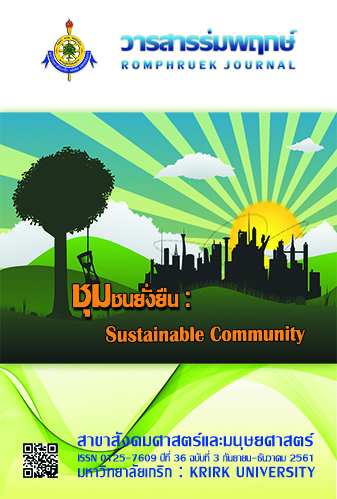Community Based Management of Flood Disaster : A Case Study of Bang Bua Canal Environmental Development Network
Main Article Content
Abstract
The aims of this research are to analyze the establishment of developing and strengthening process of Bang Bua Canal Environmental Development Network and to analyze the lesson learned from applying community-based flood disaster management of the Network. This research was a qualitative research using in-depth interviews with purposive sampling and key informants of twelve persons which were community leaders, committee members, and senior people in the community. The study found that the key factors affected the success of flood disaster management were social capital, and leadership which were able to solve problems such as communication among relevant agencies, providing information to members, etc. The recommendations for relevant parties were: community leaders with strong leadership should motivate weak leaders to develop and strengthen their leadership ability. The flood disaster management should be in a decentralized manner. The network should serve as a mentor to advise community members so that they can rely on themselves. For public information participation, the network should serve as a central database. Finally, the government agencies should decentralize their authorities to the community to enable the community to manage disaster by themselves with the government’s support for technical and financial aids. Therefore, the communities could rely on themselves, have a quick recovery, and be able to support each other in the future.
Article Details
Every article published in the Romphruek Journal of the Humanities and Social Sciences is the opinion and point of view of the authors. Thery're not the viewpoint of Krirk University or the editored department. Any part or all of the articles for pablication must be clearly cited.
References
นิเวศ ธรรมชัยชูศักดิ์ และ ธิดา กมลรุ่งเรือง. (2560). การพัฒนาขีดความสามารถด้านภาวะผู้นำกับการปฏิรูปการศึกษาของผู้บริหารสถาบันอุดมศึกษาไทยในยุคไทยแลนด์ 4.0. วารสารร่มพฤกษ์, 35(3), 91.
ทีมกรุ๊ป. (2555). “รับรู้...สู้ภัยน้ำ”. กรุงเทพฯ : เอส.เอ็น.มีเดีย แอนด์ แพ็ค,.
ปิยะพงษ์ ทองดี. (2560). ภาวะผู้นำขององค์การสมัยใหม่. วารสารร่มพฤกษ์, 36(1), 84-85.
พันธ์ศิริ ธนาริยะวงศ์. (2556). เครือข่ายการจัดการภัยพิบัติจากอุทกภัยหมู่บ้านเก้ากอ ตำบลทอนหงส์ อำเภอพรหมคีรี
จังหวัดนครศรีธรรมราช. คณะศิลปศาสตร์ มหาวิทยาลัยมหิดล, กรุงเทพฯ.
เพ็ญประภา ภัทรานุกรม. (2552). การพัฒนาทุนทางสังคมโดยใช้ชุมชนเป็นฐานในชุมชนประสบภัยพิบัติสึนามิ : กรณีศึกษาชุมชน
ในพื้นที่จังหวัดพังงา. ศูนย์ส่งเสริมวิจัยและผลิตตำรา มหาวิทยาลัยเกริก, กรุงเทพฯ.
เพ็ญประภา ภัทรานุกรม และคณะ. (2556). รายงานการวิจัยแนวทางการจัดการภัยพิบัติ โดยเครือข่ายพัฒนาสิ่งแวดล้อมคลองบางบัว. ศูนย์ส่งเสริมวิจัยและผลิตตำรา มหาวิทยาลัยเกริก และ สำนักงานกองทุนสนับสนุนการวิจัย, กรุงเทพฯ.
วัลลภัช สุขสวัสดิ์. (2561). แนวคิดทุนทางสังคมของโรเบิร์ต ดี พัตนัม และข้อท้าทาย (ROBERT D. PUTNAM’S CONCEPT OF SOCIAL CAPITAL AND ITS CHALLENGES). (10 สิงหาคม 2561) สืบค้นจาก http://pubcenter.swu.ac.th/.
ศิรินันต์ สุวรรณโมลี และคณะ. (2550). แนวทางการพัฒนาการจัดการความเสี่ยงจากภัยพิบัติโดยชุมชนเป็นฐาน
จากภาคประชาสังคม : กรณีศึกษาชุมชนบ้านน้ำเค็ม ตำบลบางม่วง อำเภอตะกั่วป่า จังหวัดพังงา.
คณะศิลปศาสตร์ มหาวิทยาลัยเทคโนโลยีพระจอมเกล้าธนบุรี, กรุงเทพฯ.
สมศักดิ์ สามัคคีธรรม. (2560). สวัสดิการชุมชนกับการสร้างสังคมเข้มแข็งในเขตกรุงเทพมหานคร. วารสารร่มพฤกษ์, 35(1), 151.
อรทัย อาจอ่ำ. (2555). การศึกษาและพัฒนาระบบการช่วยเหลือทางสังคมในภาวะวิกฤต.
สถาบันวิจัยประชากรและสังคม มหาวิทยาลัยมหิดล, กรุงเทพฯ.
Putman D. Robert. (1993). Making Democracy work : Civic traditions in Modem Italy.
Princeton University Press, U.S.A.


